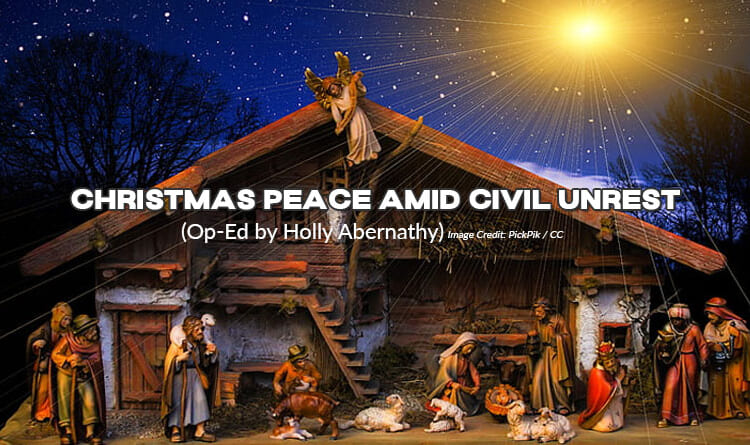Image Credit: PickPik / CC
By Holly Abernathy [Special to The Tennessee Conservative] –
In the Bible, the book of Matthew in the New Testament tells us the origins of a man named Jesus – Jesus the Messiah, Jesus the Christ, Jesus as God incarnate. While some argue the pagan practices of celebrating the Christmas holiday, Christians traditionally remember and observe the birth of Christ during the season.
Advent, manger scenes, and decades-old Christmas carols fill dark, gray winters with joy, hope, and light. More than 2,000 years ago, an extraordinary twinkling symbol in the sky illuminated the coming of the Eternal King, and led those who divinely understood the significance of the birth of Christ. Yet, just like today, power-hungry rulers and politicians existed, including the king of Judea, Herod the Great.
All the way back to 5 or 6 B.C., the date most scholars assume Jesus was born, political struggles were part of daily life under Roman rule. The same spirit of despotic aggressors is ruling many countries today, including our own. Physical bodies are different, but the characteristics are the same. Christians are experiencing an ever-increasing hostile environment in the United States, much of it coming from government entities. But as the Ecclesiastical adage states: “There is nothing new under the sun.” An insatiable thirst for power and control has existed throughout the ages, and the political circumstances surrounding the birth of Jesus are often overlooked.
The Meaning of the Name “Jesus”
Jesus is His name – in Hebrew, Yeshua (Joshua) – meaning “deliverer, savior.” When translated from Hebrew into Greek, it becomes “Jesus.” Notably, Mary’s son was named “Jesus the Christ.” According to Strong’s Concordance, the word “Christ” comes from the Greek word “Christos” meaning “Messiah” or “the anointed One.” His name is “Jesus the Messiah.” He came to save man from his sins, to be the Savior of the world. God incarnate, in the form of a helpless child, was born into humble circumstances, raised in a despised town (Nazareth), and bore our sins on a cross He created. Purposed by God as a sapling, the blood-stained wood displayed the words “INRI” stemming from the Latin phrase ”Iesus Nazarenus Rex Iudaeorum” meaning ”Jesus of Nazareth, King of the Jews.”
The true King, Jesus the Christ – the Messiah – was born in Bethlehem, meaning “house of bread.” How fitting for the King, the “Bread of Life” as stated in John 6:35, to be born in Bethlehem. He was born with the explicit, preordained, and prophesied purpose of dying, and the earthly king, Herod the Great, was threatened by him. The Messiah had come. “Christos” meaning “Messiah” or “the anointed One.”
Ruthless King Herod and “The King of the Jews”
Herod was the Roman-appointed king of Judea. He was paranoid, ruthless, and cruel and would do anything to hold onto power. King Herod’s thirst for power was unquenchable and he permitted no one to interfere with his rule, even his own wives. When suspected of treason, he had multiple family members murdered. His lust and political desires were insatiable. He, and only he, wanted to wear the title “king of the Jews.” King Herod was often challenged because he was not a full-blooded Jew, and was a descendant of Esau. Here we are given another picture of the struggle between Jacob, Hebrew patriarch, and his brother Esau, and a parallel between spiritual and earthly struggle.
The Arrival of the Magi
News of Jesus’ birth had spread throughout the region and the Magi arrived many months later. This troubled Herod, so in his struggle to retain power, he had all the male infants in Bethlehem two years of age and under killed.
Great sorrow and heartbreak overcame the people because their children had been murdered. Matthew 2:17 states:
“Then was fulfilled what was spoken by the prophet Jeremiah: ‘A voice was heard in Ramah, weeping and loud lamentation, Rachel weeping for her children; she refused to be comforted, because they are no more.’” The prophet Jeremiah spoke this in reference to the captivity of Jerusalem, as if Rachel herself was touched by the exile.
Benoni to Benjamin
Centuries earlier, Rachel, Jacob’s wife, died while giving birth to a son. Before she died, Rachel named him Benoni, meaning “son of my sorrow.” Jacob renamed him Benjamin, meaning “son of my right hand.” Both of these foreshadow and relate to Jesus, because He is both “a man of sorrows” and He sits at the right hand of God the Father. Isaiah 53:3 states: “He was despised and rejected by men, a man of sorrows and acquainted with grief…” and Hebrews 1:3 states: “…After making purification for sins, he sat down at the right hand of the Majesty on high…”
Rachel’s grave is marked by a pillar near Bethlehem. To Jacob, Bethlehem was a place of grief and death. Centuries later, under tyrannical Roman rule and a formidable king, the Savior was born and Bethlehem became a place of life.
The Public Square
Whether acknowledged or not, politics have always been a part of life, as illustrated centuries ago under the Roman Empire. Ignoring this fact has been demonstrably perilous to American society. We, as Christians, have always had a responsibility to be in the “public square,” yet have refused to speak, while louder, more aggressive, convicted voices have moved the Overton Window to a point of no return.
From the Founders meeting in a Philadelphia statehouse to construct the greatest experiment of freedom in human history to a Satanic Temple display being erected inside the Iowa Capitol, today we see evidence of the growing hostility toward Christians in this country. The display included a depiction of a goat-headed figure known as Baphomet, seven fundamental tenets upheld by The Satanic Temple, and a wreath adorned with a pentagram.
The country’s tri-colored tapestry is fraying with increasing polarization of fundamental principles, values, morals, and gods. Brother against brother, neighbor against neighbor. Enmity in the public square. Efforts to gain and retain control.
Even in Bethlehem, the hostile tyrant Herod the Great sought to protect his power and the throne at all costs – no matter the great suffering he caused – going so far as to murder innocent children.
But even in death, there was life.
Bringing Light to Darkness
The observation of the birth of Christ reminds us that He came to save us ALL – Jesus the Messiah – and that He brings life in extraordinary ways and profoundly miraculous movements, yet is clothed in simplicity and humility. The long-awaited Messiah has come, and unlike any earthly entity – government or otherwise – He will save us from our sins and from that which seeks to subdue and overcome us.
Jesus the Messiah was born into darkness and dispelled it. He can dispel it now in Israel. He can drive the darkness out of the hearts of those who seek to kill the Jewish people – both in Israel and in nations abroad – in a burgeoning twenty-first century Holocaust. He can scatter it in the Iowa Capitol, the dark halls of D.C., the homeless camps from New York and Philadelphia to San Francisco and L.A. and everywhere in between, at the southern border, and in the darkened and confused hearts of medical professionals, educators, and parents subjecting their children to irreparable mental and bodily damage deceitfully disguised as science, progress, acceptance, and inclusion.
Amid physical and political turmoil – both past and present, we hold onto the hope that the long-awaited Messiah will move the world from despair to hope, from fear to peace, from darkness to light, from mourning to rejoicing, from lamenting to singing, and from death to life, as only He – and no one else – can do.
There is and always will be “Herod the Greats,” prideful people and rulers, propaganda peddlers and politicians, and entities that reject and are antagonistically hostile to the deity and sovereignty of Christ, but may this season be a reminder that, even in the growing anti-Christian movement that is befalling this nation, Jesus the Christ, the Messiah, is greater.
About the Author: Holly Abernathy is a communications and creative arts professional. She works in a variety of media and lives in Nashville, Tennessee. For more information, visit www.6qCreative.com.














